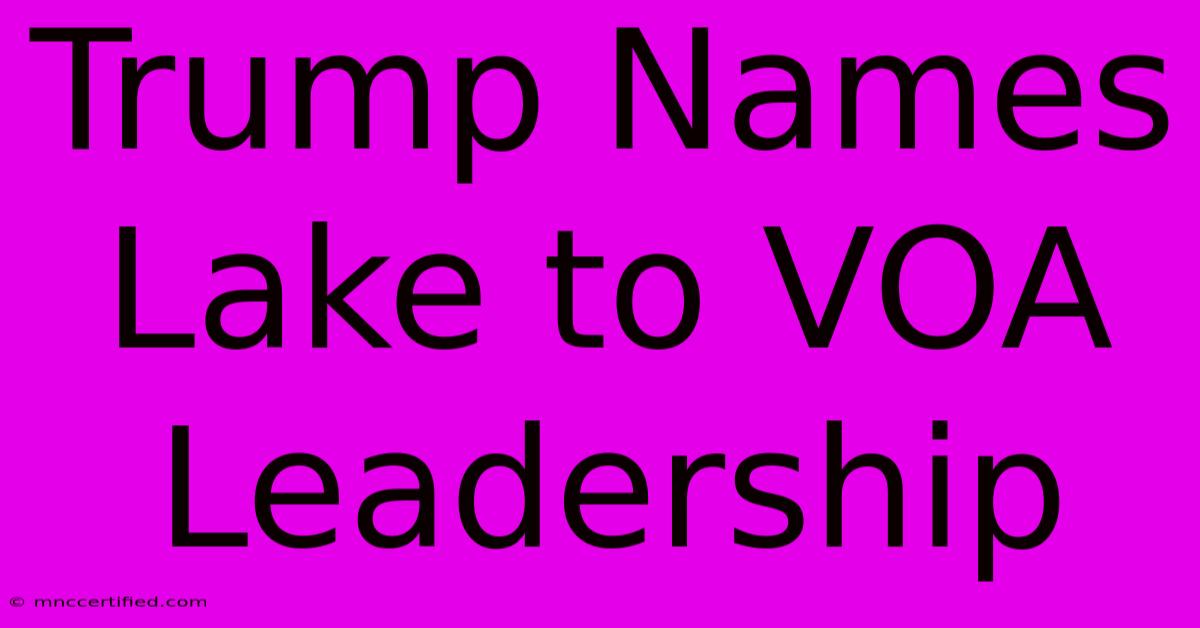Trump Names Lake To VOA Leadership

Table of Contents
Trump Names Lake to VOA Leadership: A Controversial Appointment
The appointment of Michael Pack, a conservative filmmaker with a history of criticizing the Voice of America (VOA), to lead the U.S. Agency for Global Media (USAGM) in 2020, sent shockwaves through the journalistic community. This appointment, directly influenced by then-President Donald Trump, significantly altered the landscape of the VOA and sparked intense debate about journalistic independence and political influence within the organization. This article delves into the details of this controversial appointment, its impact on VOA's operations, and the long-term implications for American international broadcasting.
Understanding the Significance of the VOA
The Voice of America is a crucial element of American soft power. Funded by the U.S. government, its mission is to provide accurate and objective news and information to international audiences. Its independence from political interference is paramount to maintaining its credibility and effectiveness. Therefore, the selection of its leadership is a matter of significant importance, impacting not only its journalistic output but also America's global image.
Pack's Background and Ideological Leanings
Michael Pack, before his appointment, was known for his conservative viewpoints and critical stance towards what he viewed as liberal bias in mainstream media. His films often reflected this perspective. This background raised immediate concerns about his potential to politicize the VOA, undermining its reputation for unbiased reporting.
The Appointment and its Immediate Fallout
Pack's appointment, driven by the Trump administration's desire for greater control over the narrative presented by USAGM entities, led to several immediate consequences:
- Leadership Purges: Pack swiftly replaced numerous high-ranking officials at VOA and other USAGM entities, often replacing them with individuals perceived to share his conservative views. This raised concerns about a systematic effort to reshape the organizations to align with a specific political agenda.
- Changes in Editorial Direction: While direct evidence of censorship was debated, there were credible reports of subtle shifts in editorial direction, leading to concerns about the suppression of diverse viewpoints and potentially biased reporting.
- Staff Morale: The rapid changes and uncertainty surrounding the organization's future significantly impacted staff morale. Many experienced journalists left VOA, citing concerns about compromised journalistic integrity and the loss of institutional autonomy.
Impact on VOA's Credibility and Global Reach
The turmoil surrounding Pack's appointment and its consequences cast a shadow over VOA's credibility. Its reputation as a reliable source of unbiased news was tarnished, potentially diminishing its global reach and effectiveness in countering misinformation and disinformation. The appointment raised questions about the extent to which political considerations outweigh the importance of journalistic integrity in U.S. foreign policy.
The Long-Term Implications
The Trump administration's influence on the VOA's leadership remains a significant case study in the potential dangers of politicizing public media. Its long-term effects are still unfolding, with potential impacts on:
- Public Trust: The erosion of trust in the VOA caused by perceived political bias could significantly harm its ability to reach and engage international audiences.
- Geopolitical Relations: A perceived lack of objectivity in American international broadcasting could damage relationships with countries that rely on the VOA for information.
- The Future of USAGM: The controversy surrounding Pack's appointment highlights the need for robust mechanisms to protect the independence of public media organizations.
Moving Forward: Safeguarding Journalistic Independence
The experience of the Pack appointment underscores the vital need for greater safeguards to protect the independence and objectivity of the VOA and other public media organizations. This requires ongoing vigilance from journalists, media watchdogs, and policymakers to ensure that political interference does not compromise the essential role these organizations play in American foreign policy and global information dissemination.
This article serves as an in-depth analysis and will benefit from incorporating relevant links to reputable news sources, academic papers, and official reports for further verification and detailed information. Remember to always cite your sources properly. Keywords used include: Trump, Voice of America, VOA, Michael Pack, USAGM, journalistic independence, political influence, media bias, American foreign policy, soft power, credible news, misinformation, disinformation. Strategic keyword placement and internal linking are crucial for on-page SEO optimization.

Thank you for visiting our website wich cover about Trump Names Lake To VOA Leadership. We hope the information provided has been useful to you. Feel free to contact us if you have any questions or need further assistance. See you next time and dont miss to bookmark.
Featured Posts
-
Trump Inaugural Marks 1 Million Donation
Dec 13, 2024
-
Foster Care Advocate Challenges Nancy Mace
Dec 13, 2024
-
Max Georges Heart Condition Hospital Stay
Dec 13, 2024
-
How To Profit From Broadcom Stock Q4
Dec 13, 2024
-
Misdemeanor Arrest For James Kennedy
Dec 13, 2024